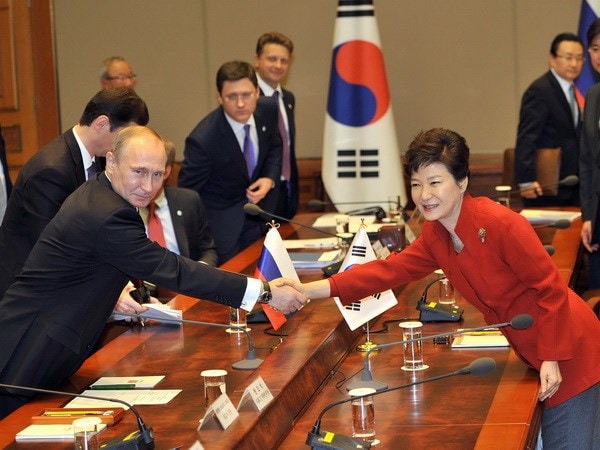Russian President holds talks with South Korean counterpart
During his visit to South Korea on November 13, Russian President Vladimir Putin held talks with his host country counterpart Park Geun-Hye.
The two leaders shared views on strengthening Asia-Europe connectivity through logistics cooperation, under which South Korea will participate in the ambitious "Silk Road" project connecting the two continents by rail and passing through the Democratic People's Republic of Korea.
The project is expected to facilitate South Korean companies to expand investment in North Korea indirectly.
 |
| South Korean President Park Geun-Hye (right) holds talks with her Russian counterpart Vladimir Putin (left). (Source: AFP/VNA) |
During the meeting, the two presidents witnessed the signing of a Memorandum of Understanding (MOU) for three South Korean companies, including steelmaker POSCO, shipping company Hyundai Merchant Marine, and state-owned Korea Railroad, to participate in the Rajin-Khasan railway project (from the port of Rajin in northeastern North Korea to the town of Khasan on the southeastern border of Russia) and develop the Rajin port.
| RELATED NEWS |
|---|
With South Korea's participation, the new railway will stretch from North Korea to the southern port of Busan, paving the way for South Korean exporters to ship goods as far as Europe.
In 2000, Mr Putin and then North Korean leader Kim Jong-il agreed on the $340 million Rajin-Khasan project.
Russian Railways contributed 70% of the shares and Pyongyang contributed the rest.
Three South Korean companies will soon be invested in the Russian stake. According to media reports, Russia wants Seoul to contribute 34% of the shares, while Moscow contributes 36% and Pyongyang contributes 30%.
South Korea's participation in the project would allow Seoul to expand its investment in Pyongyang, which has been banned under the May 24 sanctions imposed by South Korea against North Korea since 2010 after the sinking of the Cheonan warship, which Seoul blamed on a North Korean torpedo attack, although Pyongyang has denied any involvement.
Speaking at a regular press conference, South Korean Unification Ministry spokesman Park Soo-jin said the South Korean government's stance on the May 24 sanctions has not changed, but joint ventures between South Korean companies and foreign companies will not be subject to the sanctions.
Regarding the North Korean nuclear issue, the Russian President and the South Korean President affirmed that they do not accept North Korea as a nuclear power.
In a joint statement after the talks, the two leaders stressed that Pyongyang's efforts to build up its own nuclear and missile capabilities were unacceptable.
The joint statement called on North Korea to comply with its international obligations and commitments, including the Joint Statement of September 29, 2005, and stressed that the parties to the six-party nuclear talks will coordinate efforts to resume the denuclearization-for-aid dialogue.
The six-party talks, involving Russia, China, the United States, Japan and the two Koreas, have been stalled since late 2008.
North Korea announced it was leaving the negotiating table in April 2009 in protest against UN sanctions, but has recently expressed a desire to return to negotiations.
According to the joint statement, President Putin expressed support for President Park Geun-Hye's policy toward North Korea, known as the trust-building process on the Korean Peninsula, considering it an important premise for regional security and peace as well as the normalization of inter-Korean relations.
The two leaders also agreed to strengthen high-level talks on defense and political issues through regular dialogues between the two countries' foreign ministries as well as between the South Korean President's security agency and Russia's Security Council./.
According to VNA
